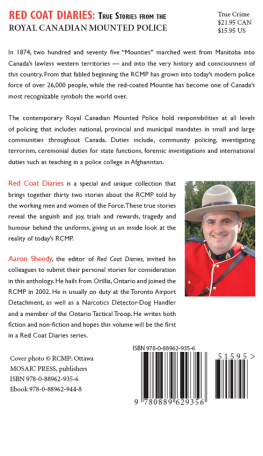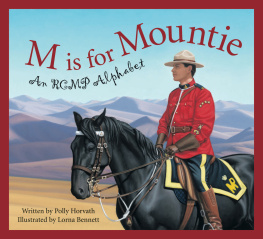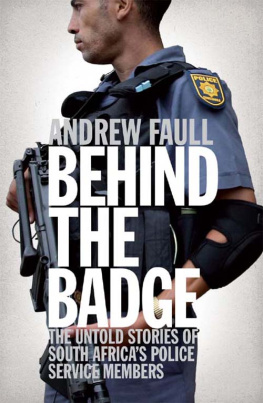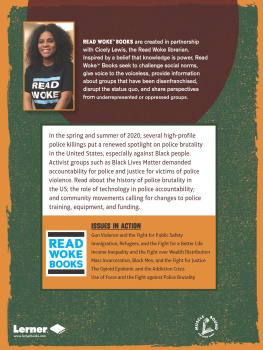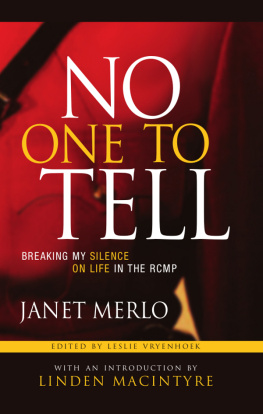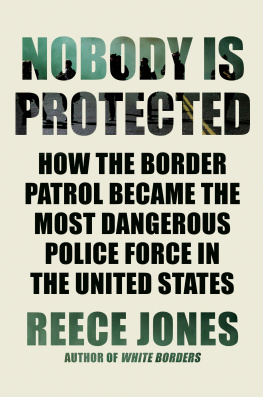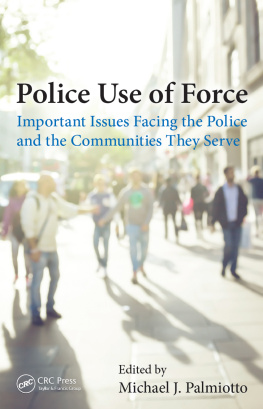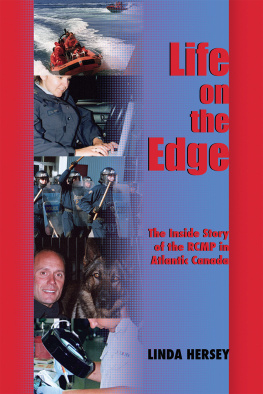RED COAT DIARIES
RED COAT DIARIES
True Stories from the Royal Canadian Mounted Police

Edited by Constable Aaron Sheedy

Library and Archives Canada Cataloguing in Publication
Red coat diaries : true stories from the Royal Canadian Mounted Police / edited by Aaron Sheedy.
ISBN 978-0-88962-935-6
eISBN 978-0-88962-945-5
1. Royal Canadian Mounted Police--Anecdotes.
I. Sheedy, Aaron, 1973-
HV8158.7.R69R43 2011 363.20971 C2011-905971-1
No part of this book may be reproduced or transmitted in any form, by any means, electronic or mechanical, including photocopying and recording, information storage and retrieval systems, without permission in writing from the publisher, except by a reviewer who may quote brief passages in a review.
Published by Mosaic Press, offices and warehouse at 1252 Speers Road, Units 1 and 2, Oakville, Ontario, L6L 5N9, Canada and Mosaic Press, 40 Sonwil Dr, Cheektowaga, NY14225, U.S.A.
Copyright The authors, 2011
ISBN 978-0-88962-935-6
Ebook 978-0-88962-944-8
Designed by Keith Daniel
| We acknowledge the financial support of the Government of Canada through the Canada Book Fund (CBF) for this project. | Nous reconnaissons laide financire du gouvernement du Canada par lentremise du Fonds du livre du Canada (FLC) pour ce projet. |
Mosaic Press in Canada:
1252 Speers Road, Units 1 & 2
Oakville, Ontario
L6L 5N9
Phone/Fax: 905-825-2130
| Mosaic Press in U.S.A.:
c/o Livingston, 40 Sonwil Dr,
Cheektowaga, NY
14225
Phone/Fax: 905-825-2130
|
www.mosaic-press.com
In Memory of
Constable Christopher Worden
Constable Douglas Scott
Sergeant John Storer
We continue to tell your stories.
TABLE OF CONTENTS
FOREWORD
M y experience with the Royal Canadian Mounted Police (RCMP) is unique, as are the experiences of the contributors to this book. Fortunately, my story is not one that is shared by many.
My journey in the RCMP did not begin at Depot. I do not arrest criminals on a daily basis. I do not put myself in harms way, day in and day out, to protect the lives of Canadians. I am a federal public servant, working as a leadership consultant in the RCMPs Learning and Development section in Ottawa, Ontario. When I began this job in January 2009, it was not my first exposure to the RCMP. My life within the RCMP family began when I married Constable Chris Worden in 2003.
I lived the life of an RCMP spouse in the Northwest Territories for nearly five years. I adapted to the life of my husband, who worked shifts and was often on call. My vocabulary grew to include a multitude of acronyms, as I tried to keep up with all of the blue-world talk in which I became immersed. I even earned a paycheque guarding cells occasionally in the isolated, two-person detachment in the northern settlement of Wha Ti, Northwest Territories, where we lived for nearly two years. I learned how to operate a two-way radio, use ten codes, drive snow machines and boats, and was able to prompt my husband with the standard questions when calls from the telecoms operator came into the house in the middle of the night. This was my life as a Mounties wife up North, and I loved it.
This all changed on October 6, 2007 when I received the worst news that an RCMP family member could receive. Chris had been killed while on duty in Hay River. My life as I had known it ended. I had now joined the unofficial club of RCMP widows.
It may sound clich, but the RCMP is a huge family. They took me in when I married a member (RCMP officers are known as members), and they were there to support me through the planning of a regimental funeral and the preparation and signing of documents. They kept me informed (as much as they could) of the investigation and legal proceedings, assisted me when I decided to move out of the North, and continually offered to provide support in any way they could to our family.
In the months after the two shootings in the North that claimed the lives of both Chris and Constable Douglas Scott, I became very vocal in the media about the lack of a backup policy and the need for the RCMP to keep their membership safer. I wanted the Force to move quickly on changing officer safety procedures. I have been asked, on many occasions, How can you work for the RCMP after what happened to you? My answer is relatively simple: I want to be part of the solution. I want to make things better.
The RCMP is highlighted daily by the media with stories it believes will capture the interests of the greatest audience. Unfortunately, these stories focus on the occurrences that illustrate a dramatic event or the perceived questionable behaviour of a small percentage of RCMP employees. Sweeping generalizations are then made about the quality and leadership of the RCMP. This type of reporting frustrates me because there are so many instances, every day, that involve RCMP employees providing a positive service to their communities, but these do not reach the eyes or ears of the general public.
The people in the RCMP work every day to protect those who have chosen to live in Canada. Sure, as in any large organization, there are opportunities to improve on existing policies and procedures, and there are employees who make poor decisions on occasion. It is unfortunate, however, that these issues make front page news ahead of the stories where Mounties have made a sexual assault victim safe and comfortable enough to tell his or her story, so that charges can be laid and the perpetrator stopped from victimizing someone else. Or instead of when a member goes into a local school to teach young students about the debilitating influence and effects of drugs and alcohol through the D.A.R.E. Program. Or ahead of the team of operators who remove a drug dealer from the streets so that a life is not unnecessarily taken, and somebody else wont have to receive the news that I did.
Working for the RCMP allows me to give back to the people who protect our country. Helping to design and create leadership programs within the Force gives me the opportunity to enhance employees careers, while simultaneously contributing to a better prepared and competent organization. It gives me a purposea purpose that I am proud of.
I was honoured and humbled when approached about writing this foreword. I feel that the stories shared in this book illustrate the dedication and human perspective of each author. It is the human perspective of the RCMP organization that I experienced and continue to advocate for. These are the stories that need to be shared to promote the continued positive efforts of our employees. It is my belief that if more people are exposed to this side of its employees, and the RCMP organization as a whole, public perception will change. There is power in education. I am grateful for the efforts of Aaron Sheedy and to the RCMP for allowing these stories to be shared, and, thus, enabling the public to get a glimpse of the positive aspects of the RCMP.
I salute all the men and women who have contributed to this book and all those who continually risk their lives to assist others. You have the support of those who understand your world. You are doing your part to educate others who have limited exposure to the life led by an RCMP officer. I applaud you for your contributions to the individuals and communities you serve. You will forever have my full support.
Next page
